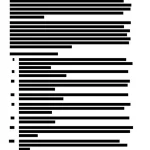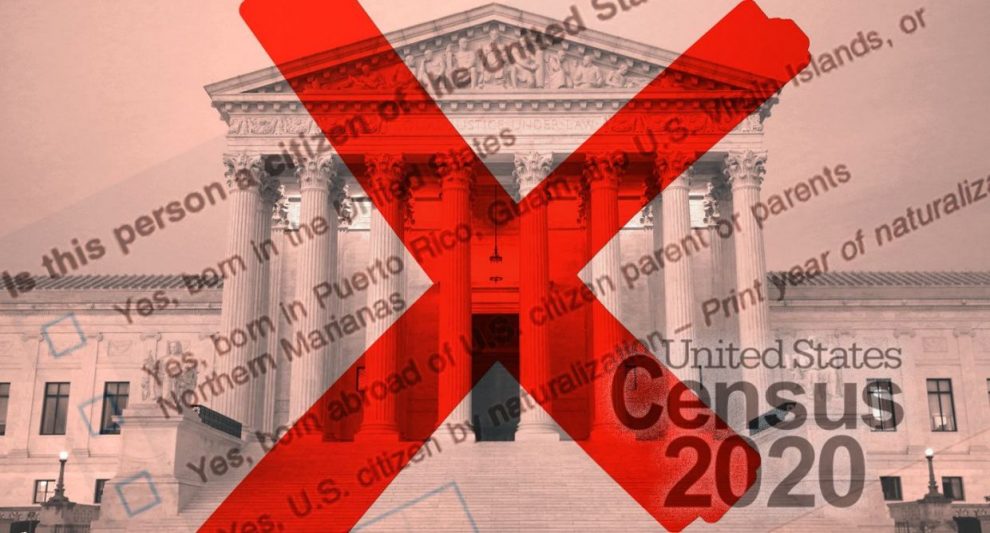WASHINGTON, DC – Chief Justice John Roberts was the swing vote in a sharply divided Supreme Court that voted 5-4 in deciding the U.S. census can ask about citizenship, but by a separate 5-4 vote is sending the case back to the lower court.
Consequently, the citizenship question cannot be asked on the 2020 census, because the additional hearing cannot take place before the cutoff for printing the census forms for next year.
This decision will immediately be compared to the 2012 decision saving Obamacare. Roberts was joined by the four conservative justices to say federal law permits asking about citizenship, but then switched over to join with the four liberal justices to remand the case to the federal trial court for further evidentiary hearings.
The chief justice began for the Court:
‘Third-party’ auditor investigating Minnesota fraud received millions in state Medicaid funds
Macron vows nuclear arsenal boost as Europe turns to nukes amid rising global threats
‘Under siege’: Inside the growing radical Islam threat critics say is hiding in plain sight in deep red Texas
Walz-Ellison administration ‘enabled’ Minnesota’s fraud scandal: Guy Benson
NYC Dept of Education employee arrested, charged with murder of Bronx father
Savannah Guthrie returns to ‘Today’ show studio for first time since mother went missing
Iran widens regional war with first strike into Azerbaijan
5 House Oversight Committee Republicans Join with Democrats to Subpoena Pam Bondi in Epstein Probe
As Jasmine Crockett Concedes Texas Senate Primary, Attention Focuses on Radical Dem Who Beat Her
Tom Emmer calls for Tim Walz, Keith Ellison to ‘serve jail time’ if fraud coverup allegations are true
Republican Rep Burgess Owens to retire from Congress when term ends
VIDEO: College Basketball Ref Knocked Out Cold When Players Turn Violent on Court
DOJ Ends Investigation Into Autopen Scandal With Zero Charges, Grand Juries, or Indictments
The ‘woo-woo’ philosophy of Trump’s surgeon general pick
Illegal’s dragging of ICE agent shows the exact danger the officer who shot Renee Good feared, expert says
The Secretary of Commerce decided to reinstate a question about citizenship on the 2020 census questionnaire. A group of plaintiffs challenged that decision on constitutional and statutory grounds. We now decide whether the Secretary violated the Enumeration Clause of the Constitution, the Census Act, or otherwise abused his discretion.
He later wrote:
The Enumeration Clause of the Constitution does not provide a basis to set aside the Secretary’s decision. The text of that clause “vests Congress with virtually unlimited discretion in conducting the decennial ‘actual Enumeration,’ ” and Congress “has delegated its broad authority over the census to the Secretary.” Given that expansive grant of authority, we have rejected challenges to the conduct of the census where the Secretary’s decisions bore a “reasonable relationship to the accomplishment of an actual enumeration.”
Roberts noted “demographic questions have been asked in every census since 1790, and questions about citizenship in particular have been asked for nearly as long.”
The Court reasoned:
‘Third-party’ auditor investigating Minnesota fraud received millions in state Medicaid funds
Macron vows nuclear arsenal boost as Europe turns to nukes amid rising global threats
‘Under siege’: Inside the growing radical Islam threat critics say is hiding in plain sight in deep red Texas
Walz-Ellison administration ‘enabled’ Minnesota’s fraud scandal: Guy Benson
NYC Dept of Education employee arrested, charged with murder of Bronx father
Savannah Guthrie returns to ‘Today’ show studio for first time since mother went missing
Iran widens regional war with first strike into Azerbaijan
5 House Oversight Committee Republicans Join with Democrats to Subpoena Pam Bondi in Epstein Probe
As Jasmine Crockett Concedes Texas Senate Primary, Attention Focuses on Radical Dem Who Beat Her
Tom Emmer calls for Tim Walz, Keith Ellison to ‘serve jail time’ if fraud coverup allegations are true
Republican Rep Burgess Owens to retire from Congress when term ends
VIDEO: College Basketball Ref Knocked Out Cold When Players Turn Violent on Court
DOJ Ends Investigation Into Autopen Scandal With Zero Charges, Grand Juries, or Indictments
The ‘woo-woo’ philosophy of Trump’s surgeon general pick
Illegal’s dragging of ICE agent shows the exact danger the officer who shot Renee Good feared, expert says
We look instead to Congress’s broad authority over the census, as informed by long and consistent historical practice. All three branches of Government have under- stood the Constitution to allow Congress, and by extension the Secretary, to use the census for more than simply counting the population. Since 1790, Congress has sought, or permitted the Secretary to seek, information about matters as varied as age, sex, marital status, health, trade, profession, literacy, and value of real estate owned. Since 1820, it has sought, or permitted the Secretary to seek, information about citizenship in particular. Federal courts have approved the practice of collecting demographic data in the census.
That history matters. Here, as in other areas, our interpretation of the Constitution is guided by a Government practice that “has been open, widespread, and unchallenged since the early days of the Republic.” In light of the early understanding of and long practice under the Enumeration Clause, we conclude that it permits Congress, and by extension the Secretary, to inquire about citizenship on the census questionnaire.
Roberts continued, turning to the next legal issue in the case:
The District Court set aside the Secretary’s decision to reinstate a citizenship question on the grounds that the Secretary acted arbitrarily and violated certain provisions of the Census Act. The Government contests those rulings, but also argues that the Secretary’s decision was not judicially reviewable under the Administrative Procedure Act in the first place.
The Administrative Procedure Act embodies a basic presumption of judicial review,” and instructs reviewing courts to set aside agency action that is “arbitrary, capricious, an abuse of discretion, or otherwise not in accordance with law.” Review is not available, however, “to the extent that” a relevant statute precludes it, or the agency action is “committed to agency discretion by law.” The Government argues that the Census Act commits to the Secretary’s unreviewable discretion decisions about what questions to include on the decennial census questionnaire.
“We disagree,” Roberts wrote, concluding these legal requirements “do not leave his discretion unbounded.”
“The taking of the census is not one of those areas traditionally committed to agency discretion,” he continued. “We and other courts have entertained both constitutional and statutory challenges to census-related decisionmaking.”
“At the heart of this suit is respondents’ claim that the Secretary abused his discretion in deciding to reinstate a citizenship question,” the chief justice explained.
“Our scope of review is narrow: we determine only whether the Secretary examined the relevant data and articulated a satisfactory explanation for his decision,” Roberts wrote, “including a rational connection between the facts found and the choice made.”
‘Third-party’ auditor investigating Minnesota fraud received millions in state Medicaid funds
Macron vows nuclear arsenal boost as Europe turns to nukes amid rising global threats
‘Under siege’: Inside the growing radical Islam threat critics say is hiding in plain sight in deep red Texas
Walz-Ellison administration ‘enabled’ Minnesota’s fraud scandal: Guy Benson
NYC Dept of Education employee arrested, charged with murder of Bronx father
Savannah Guthrie returns to ‘Today’ show studio for first time since mother went missing
Iran widens regional war with first strike into Azerbaijan
5 House Oversight Committee Republicans Join with Democrats to Subpoena Pam Bondi in Epstein Probe
As Jasmine Crockett Concedes Texas Senate Primary, Attention Focuses on Radical Dem Who Beat Her
Tom Emmer calls for Tim Walz, Keith Ellison to ‘serve jail time’ if fraud coverup allegations are true
Republican Rep Burgess Owens to retire from Congress when term ends
VIDEO: College Basketball Ref Knocked Out Cold When Players Turn Violent on Court
DOJ Ends Investigation Into Autopen Scandal With Zero Charges, Grand Juries, or Indictments
The ‘woo-woo’ philosophy of Trump’s surgeon general pick
Illegal’s dragging of ICE agent shows the exact danger the officer who shot Renee Good feared, expert says
The Court majority concluded Ross’s decision was supported by sufficient evidence and therefore rejected that part of the legal challenge, but held the record was not clear on whether the Trump administration’s rationale for asking the question might have been a pretext masking some other motivation, and therefore that the case must be subject to more exploration in the lower court.
Roberts wrote in a part of the decision that was 5-4:
… viewing the evidence as a whole, we share the District Court’s conviction that the decision to reinstate a citizenship question cannot be adequately explained in terms of DOJ’s request for improved citizenship data to better enforce the VRA. Several points, considered together, reveal a significant mismatch between the decision the Secretary made and the rationale he provided.
The record shows that the Secretary began taking steps to reinstate a citizenship question about a week into his tenure, but it contains no hint that he was considering VRA enforcement in connection with that project. The Secretary’s Director of Policy did not know why the Secre- tary wished to reinstate the question, but saw it as his task to “find the best rationale.” ….
“We are presented, in other words, with an explanation for agency action that is incongruent with what the record reveals about the agency’s priorities and decisionmaking process,” Roberts wrote, adding, “we cannot ignore the disconnect between the decision made and the explanation given.”
The five-justice Roberts-led majority concluded:
In these unusual circumstances, the District Court was warranted in remanding to the agency, and we affirm that disposition. We do not hold that the agency decision here was substantively invalid. But agencies must pursue their goals reasonably. Reasoned decisionmaking under the Administrative Procedure Act calls for an explanation for agency action. What was provided here was more of a distraction.
Justice Stephen Breyer wrote an opinion concurring in part and dissenting in part, joined by Justices Ruth Bader Ginsburg, Sonia Sotomayor, and Stephen Breyer. They wrote they agreed to remand the case because of pretext. But they dissented in part, and would hold that including the citizenship question violates the law even if they found no pretext.
‘Third-party’ auditor investigating Minnesota fraud received millions in state Medicaid funds
Macron vows nuclear arsenal boost as Europe turns to nukes amid rising global threats
‘Under siege’: Inside the growing radical Islam threat critics say is hiding in plain sight in deep red Texas
Walz-Ellison administration ‘enabled’ Minnesota’s fraud scandal: Guy Benson
NYC Dept of Education employee arrested, charged with murder of Bronx father
Savannah Guthrie returns to ‘Today’ show studio for first time since mother went missing
Iran widens regional war with first strike into Azerbaijan
5 House Oversight Committee Republicans Join with Democrats to Subpoena Pam Bondi in Epstein Probe
As Jasmine Crockett Concedes Texas Senate Primary, Attention Focuses on Radical Dem Who Beat Her
Tom Emmer calls for Tim Walz, Keith Ellison to ‘serve jail time’ if fraud coverup allegations are true
Republican Rep Burgess Owens to retire from Congress when term ends
VIDEO: College Basketball Ref Knocked Out Cold When Players Turn Violent on Court
DOJ Ends Investigation Into Autopen Scandal With Zero Charges, Grand Juries, or Indictments
The ‘woo-woo’ philosophy of Trump’s surgeon general pick
Illegal’s dragging of ICE agent shows the exact danger the officer who shot Renee Good feared, expert says
Justice Clarence Thomas, joined by Justices Neil Gorsuch and Brett Kavanaugh, would have ruled entirely in favor of the Trump administration, beginning:
In March 2018, the Secretary of Commerce exercised his broad discretion over the administration of the decennial census to resume a nearly unbroken practice of asking a question relating to citizenship. Our only role in this case is to decide whether the Secretary complied with the law and gave a reasoned explanation for his decision. The Court correctly answers these questions in the affirmative. That ought to end our inquiry.
The Court, however, goes further. For the first time ever, the Court invalidates an agency action solely because it questions the sincerity of the agency’s otherwise adequate rationale. Echoing the din of suspicion and distrust that seems to typify modern discourse, the Court declares the Secretary’s memorandum “pretextual” because, “viewing the evidence as a whole,” his explanation that including a citizenship question on the census would help enforce the Voting Rights Act (VRA) “seems to have been contrived.” The Court does not hold that the Secretary merely had additional, unstated reasons for reinstating the citizenship question. Rather, it holds that the Secretary’s stated rationale did not factor at all into his decision.
The Court’s holding reflects an unprecedented departure from our deferential review of discretionary agency decisions. And, if taken seriously as a rule of decision, this holding would transform administrative law. It is not difficult for political opponents of executive actions to generate controversy with accusations of pretext, deceit, and illicit motives. Significant policy decisions are regularly criticized as products of partisan influence, interest- group pressure, corruption, and animus. Crediting these accusations on evidence as thin as the evidence here could lead judicial review of administrative proceedings to devolve into an endless morass of discovery and policy disputes not contemplated by the Administrative Procedure Act (APA).
Unable to identify any legal problem with the Secretary’s reasoning, the Court imputes one by concluding that he must not be telling the truth….
The law requires a more impartial approach. Even assuming we are authorized to engage in the review undertaken by the Court—which is far from clear—we have often stated that courts reviewing agency action owe the Executive a presumption of regularity. The Court pays only lipservice to this principle. But, the evidence falls far short of supporting its decision. The Court, I fear, will come to regret inventing the principles it uses to achieve today’s result.
After dissecting Roberts’s opinion for the majority, Thomas responded:
This conclusion is extraordinary. The Court engages in an unauthorized inquiry into evidence not properly before us to reach an unsupported conclusion. Moreover, each step of the inquiry offends the presumption of regularity we owe the Executive. The judgment of the District Court should be reversed.
Thomas later explained:
We have held that a court is ordinarily limited to evaluating the agency’s contemporaneous explanation in light of the existing administrative record… If an agency’s stated findings and conclusions withstand scrutiny, the APA does not permit a court to set aside the decision solely because the agency had other unstated reasons for its decision, such as political considerations or the Administration’s priorities.
“Unsurprisingly, then, this Court has never held an agency decision arbitrary and capricious on the ground that its supporting rationale was ‘pretextual,’” Thomas reasoned. “Nor has it previously suggested that this was even a possibility.”
‘Third-party’ auditor investigating Minnesota fraud received millions in state Medicaid funds
Macron vows nuclear arsenal boost as Europe turns to nukes amid rising global threats
‘Under siege’: Inside the growing radical Islam threat critics say is hiding in plain sight in deep red Texas
Walz-Ellison administration ‘enabled’ Minnesota’s fraud scandal: Guy Benson
NYC Dept of Education employee arrested, charged with murder of Bronx father
Savannah Guthrie returns to ‘Today’ show studio for first time since mother went missing
Iran widens regional war with first strike into Azerbaijan
5 House Oversight Committee Republicans Join with Democrats to Subpoena Pam Bondi in Epstein Probe
As Jasmine Crockett Concedes Texas Senate Primary, Attention Focuses on Radical Dem Who Beat Her
Tom Emmer calls for Tim Walz, Keith Ellison to ‘serve jail time’ if fraud coverup allegations are true
Republican Rep Burgess Owens to retire from Congress when term ends
VIDEO: College Basketball Ref Knocked Out Cold When Players Turn Violent on Court
DOJ Ends Investigation Into Autopen Scandal With Zero Charges, Grand Juries, or Indictments
The ‘woo-woo’ philosophy of Trump’s surgeon general pick
Illegal’s dragging of ICE agent shows the exact danger the officer who shot Renee Good feared, expert says
“But even if they were, an agency action is not arbitrary or capricious merely because the decisionmaker has other, unstated reasons for the decision,” he added.
“The Court errs at the outset by proceeding beyond the administrative record to evaluate pretext,” the three justices went on. “Respondents have not made a strong showing of bad faith or improper behavior.”
After examining the purported evidence, Thomas determined:
This evidence fails to make a strong showing of bad faith or improper behavior. Taken together, it proves at most that the Secretary was predisposed to add a citizenship question to the census and took steps to achieve that end before settling on the VRA rationale he included in his memorandum. Perhaps he had reasons for adding the citizenship question other than the VRA, but by the Court’s own telling, that does not amount to evidence of bad faith or improper behavior.
“Even if it were appropriate for the Court to rely on evidence outside the administrative record, that evidence still fails to establish pretext,” he added.
“I do not understand how the specificity of the DOJ’s letter bears on whether the Secretary’s rationale was pretextual,” Thomas continued, “particularly since the letter specifically explained why ‘census questionnaire data regarding citizenship, if available, would be more appropriate for use in redistricting and in [VRA] litigation’ than existing data.”
“In short, the evidence cited by the Court establishes, at most,” Thomas reasoned, “that leadership at both the Department of Commerce and the DOJ believed it important—for a variety of reasons—to include a citizenship question on the census.”
“Finally, if there could be any doubt about this conclusion, the presumption of regularity resolves it,” he added for good measure. “Where there are equally plausible views of the evidence, one of which involves attributing bad faith to an officer of a coordinate branch of Government, the presumption compels giving the benefit of the doubt to that officer.”
Thomas concluded for himself, Gorsuch, and Kavanaugh:
‘Third-party’ auditor investigating Minnesota fraud received millions in state Medicaid funds
Macron vows nuclear arsenal boost as Europe turns to nukes amid rising global threats
‘Under siege’: Inside the growing radical Islam threat critics say is hiding in plain sight in deep red Texas
Walz-Ellison administration ‘enabled’ Minnesota’s fraud scandal: Guy Benson
NYC Dept of Education employee arrested, charged with murder of Bronx father
Savannah Guthrie returns to ‘Today’ show studio for first time since mother went missing
Iran widens regional war with first strike into Azerbaijan
5 House Oversight Committee Republicans Join with Democrats to Subpoena Pam Bondi in Epstein Probe
As Jasmine Crockett Concedes Texas Senate Primary, Attention Focuses on Radical Dem Who Beat Her
Tom Emmer calls for Tim Walz, Keith Ellison to ‘serve jail time’ if fraud coverup allegations are true
Republican Rep Burgess Owens to retire from Congress when term ends
VIDEO: College Basketball Ref Knocked Out Cold When Players Turn Violent on Court
DOJ Ends Investigation Into Autopen Scandal With Zero Charges, Grand Juries, or Indictments
The ‘woo-woo’ philosophy of Trump’s surgeon general pick
Illegal’s dragging of ICE agent shows the exact danger the officer who shot Renee Good feared, expert says
Now that the Court has opened up this avenue of attack, opponents of executive actions have strong incentives to craft narratives that would derail them. Moreover, even if the effort to invalidate the action is ultimately unsuccess- ful, the Court’s decision enables partisans to use the courts to harangue executive officers through depositions, discovery, delay, and distraction. The Court’s decision could even implicate separation-of-powers concerns insofar as it enables judicial interference with the enforcement of the laws.
In short, today’s decision is a departure from traditional principles of administrative law. Hopefully it comes to be understood as an aberration—a ticket good for this day and this train only.
Justice Samuel Alito wrote a strongly worded dissent that basically tracked the same bottom line as Justice Thomas’s opinion, beginning:
It is a sign of our time that the inclusion of a question about citizenship on the census has become a subject of bitter public controversy and has led to today’s regrettable decision. While the decision to place such a question on the 2020 census questionnaire is attacked as racist, there is a broad international consensus that inquiring about citizenship on a census is not just appropriate but advisable. No one disputes that it is important to know how many inhabitants of this country are citizens.And the most direct way to gather this information is to ask for it in a census. The United Nations recommends that a census inquire about citizenship,and many countries do so.
Asking about citizenship on the census also has a rich history in our country. Every census, from the very first one in 1790 to the most recent in 2010, has sought not just a count of the number of inhabitants but also varying amounts of additional demographic information. In 1800, Thomas Jefferson, as president of the American Philosophical Society, signed a letter to Congress asking for the inclusion on the census of questions regarding “the respective numbers of native citizens, citizens of foreign birth, and of aliens” “for the purpose . . . of more exactly distinguishing the increase of population by birth and immigration.”
“Now, for the first time, this Court has seen fit to claim a role with respect to the inclusion of a citizenship question on the census,” wrote Alito, “and in doing so, the Court has set a dangerous precedent, both with regard to the census itself and with regard to judicial review of all other executive agency actions.”
“To put the point bluntly,” he continued, “the Federal Judiciary has no authority to stick its nose into the question whether it is good policy to include a citizenship question on the census or whether the reasons given by Secretary Ross for that decision were his only reasons or his real reasons.”
‘Third-party’ auditor investigating Minnesota fraud received millions in state Medicaid funds
Macron vows nuclear arsenal boost as Europe turns to nukes amid rising global threats
‘Under siege’: Inside the growing radical Islam threat critics say is hiding in plain sight in deep red Texas
Walz-Ellison administration ‘enabled’ Minnesota’s fraud scandal: Guy Benson
NYC Dept of Education employee arrested, charged with murder of Bronx father
Savannah Guthrie returns to ‘Today’ show studio for first time since mother went missing
Iran widens regional war with first strike into Azerbaijan
5 House Oversight Committee Republicans Join with Democrats to Subpoena Pam Bondi in Epstein Probe
As Jasmine Crockett Concedes Texas Senate Primary, Attention Focuses on Radical Dem Who Beat Her
Tom Emmer calls for Tim Walz, Keith Ellison to ‘serve jail time’ if fraud coverup allegations are true
Republican Rep Burgess Owens to retire from Congress when term ends
VIDEO: College Basketball Ref Knocked Out Cold When Players Turn Violent on Court
DOJ Ends Investigation Into Autopen Scandal With Zero Charges, Grand Juries, or Indictments
The ‘woo-woo’ philosophy of Trump’s surgeon general pick
Illegal’s dragging of ICE agent shows the exact danger the officer who shot Renee Good feared, expert says
“In addition to requiring an examination of the text and structure of the relevant statutes,” Alito explained, “our APA §701(a)(2) cases look to whether the agency action in question is a type that has traditionally been viewed as committed to agency discretion or whether it is instead one that federal courts regularly review.”
“Here, there is no relevant record of judicial review. We are confronted with a practice that reaches back two centuries,” Alito reasoned. “Notably absent from that long record is any practice of judicial review of the content of the census.”
“In sum, neither respondents nor my colleagues have been able to identify any relevant, judicially manageable limits on the Secretary’s decision to put a core demographic question back on the census,” he added.
Alito concludes:
Throughout our Nation’s history, the Executive Branch has decided without judicial supervision or interference whether and, if so, in what form the decennial census should inquire about the citizenship of the inhabitants of this country. Whether to put a citizenship question on the 2020 census questionnaire is a question that is committed by law to the discretion of the Secretary of Commerce and is therefore exempt from APA review. The District Court had the authority to decide respondents’ constitutional claims, but the remainder of their complaint should have been dismissed.
Conservatives and the Trump administration will be deeply disappointed by this decision, and are likely to harshly criticize the chief justice. Some will undoubtedly say that this was an attempt to avoid political controversy, as those same people said in 2012 when a 5-4 Roberts-led majority ruled in favor of Obamacare in NFIB v. Sebelius.
The impact of today’s decision reaches far beyond the 2020 census. Justice Thomas concluded in his dissenting opinion for conservative justices:
The Court’s erroneous decision in this case is bad enough, as it unjustifiably interferes with the 2020 census. But the implications of today’s decision are broader. With today’s decision, the Court has opened a Pandora’s box of pretext-based challenges in administrative law.
Today’s decision marks the first time the Court has ever invalidated an agency action as “pretextual.” Having taken that step, one thing is certain: This will not be the last time it is asked to do so. Virtually every significant agency action is vulnerable to the kinds of allegations the Court credits today. These decisions regularly involve coordination with numerous stakeholders and agencies, involvement at the highest levels of the Executive Branch, opposition from reluctant agency staff, and—perhaps most importantly—persons who stand to gain from the action’s demise. Opponents of future executive actions can be expected to make full use of the Court’s new approach.
‘Third-party’ auditor investigating Minnesota fraud received millions in state Medicaid funds
Macron vows nuclear arsenal boost as Europe turns to nukes amid rising global threats
‘Under siege’: Inside the growing radical Islam threat critics say is hiding in plain sight in deep red Texas
Walz-Ellison administration ‘enabled’ Minnesota’s fraud scandal: Guy Benson
NYC Dept of Education employee arrested, charged with murder of Bronx father
Savannah Guthrie returns to ‘Today’ show studio for first time since mother went missing
Iran widens regional war with first strike into Azerbaijan
5 House Oversight Committee Republicans Join with Democrats to Subpoena Pam Bondi in Epstein Probe
As Jasmine Crockett Concedes Texas Senate Primary, Attention Focuses on Radical Dem Who Beat Her
Tom Emmer calls for Tim Walz, Keith Ellison to ‘serve jail time’ if fraud coverup allegations are true
Republican Rep Burgess Owens to retire from Congress when term ends
VIDEO: College Basketball Ref Knocked Out Cold When Players Turn Violent on Court
DOJ Ends Investigation Into Autopen Scandal With Zero Charges, Grand Juries, or Indictments
The ‘woo-woo’ philosophy of Trump’s surgeon general pick
Illegal’s dragging of ICE agent shows the exact danger the officer who shot Renee Good feared, expert says
The case is Department of Commerce v. New York, No. 18-966 in the Supreme Court of the United States.
Story cited here.
























